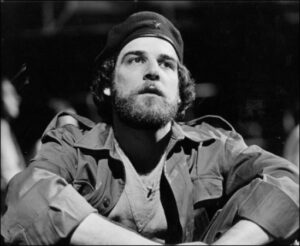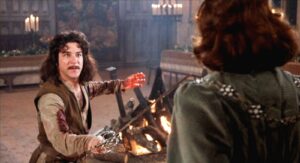In 1980, Mandy Patinkin won a Tony Award for his role as Che in the Broadway musical Evita. And while being a “theater rat” is how he got his start, his visit to St. Paul this week is a continuation of his passion that dates back to the late 1980s. Patinkin brings his show “Mandy Patinkin in Concert: Being Alive” to the Ordway Center for the Performing Arts on April 19 and 21. Ahead of the visit, Patinkin talked with TC Jewfolk about being on stage, balancing the variety of projects in his life, and the importance of tikkun olam. (Note: the interview has been lightly edited for length and clarity).
Tickets for the show can be found on the Ordway website.
TCJ: How do you balance when you want to take on certain projects?
Mandy Patinkin: The constant in my life since 1988, 1989 has been the concert stage, which I never expected to be a part of my life. It entered my life around that time after I made my first album, and the question was, well, now what do we do with this music? Joe Papp said, ‘Well, why don’t you try it out on stage while you do Leontes (in The Winter’s Tale) for the odd six Monday nights? Try your little music thing out and see how it works? He put his hands on my shoulders looking in the mirror after the show and went ‘Well, I guess you like doing that.’ It just took over my life in a way that I’m so grateful for I can’t put into words. If I had to choose between [acting] and a live concert venue, I would absolutely let the rest of it go by and only do the live concert venue. There’s nothing more satisfying. You’re with the audience. It’s in the moment. Everything that happened in our lives, in our world, that day, that moment is reflected on what goes on in that room. It’s contagious between all of us. The people in the audience make the evening become alive.
TCJ: The same could also be said for being on stage performing a show, which is sort of where your career started.
MP: Yeah, I’m a theatre rat. It’s part of your wish and hope and prayer that the craft brings you to a point of focus where you are in the moment. Meaning you are serving the play, but also serving your imagination. Whether you’re singing words by Stephen Sondheim, reading words by Alex Gansa for Homeland, or by William Goldman for The Princess Bride, whatever venue you’re working with, the game – for me – is to connect.
TCJ: Everybody has a different entry point to where they were introduced to you; for some, it’s Yentl, for me it’s The Princess Bride. For others, it’s Criminal Minds or Homeland. Do you get that a lot where people come up to you and say ‘Oh you’re so and so from some particular role’?
MP: Yes, and that’s great fun. I love it that people have no idea that I sing, or they have no idea that I act, or they’ve never seen me in any of these things that people are talking about. I love that. And it makes me feel ‘oh, there’s a tomorrow.’ I love people who I meet, who’ve never heard of me or even know that I’m in show business. Those are my favorites. James Lapine wrote in Sunday in the Park with George, he had my character, George, say ‘Connect George, connect.’ I took that home. If there were words or a tombstone ever at some point, or words written about what my life was, I would want the four words to say ‘He tried to connect.’ That’s my wish of the moment and always has been. And that’s the accident of saying yes to a variety of things.
TCJ: A lot of people also became introduced to you and your wife Kathryn Grody because of the TikTok account you started during the pandemic, which became popular during the pandemic.
MP: April 16 2020, during the pandemic, my son Gideon was working on the road and worried about his parents. He came home to try to be with us to take care of us. And we were taking walks a thousand feet apart on the road. And we stopped in front of the forsythia trees. For a few years even before that he’d pull out his phone and say, ‘family archives’ and a need to ask us questions for the unborn grandchildren. Now the grandchildren had been born, but before, he did just have some record of who we were, in case, particularly with the terror of a pandemic, we’re not here the next minute. And so we answered his question. ‘Today is April 16. April 16, 1978. It was the anniversary of our first date together, Kathryn and me.’ It’s our anniversary, and we had a fight. We’ve got the dog with us, and we’re standing there. And we talked about the fight, and then it’s over. And [Gideon] says to us the next morning ‘You know, I think people would enjoy hearing what you guys just said. People are really frightened right now with the pandemic [and]…also help people just for the day because it was just fun to hear.’ (After Gideon posts the video), it gets like, you know, a half a million hits, whatever that means. And then it never stopped. And all of a sudden, we’re in this other zone, where we’re making people laugh and feel, not worried about the moments of the pandemic. And, and it was like, even if we were tired of doing that, it was like, if you make people laugh, you don’t just stop when people need to laugh, and have a break when they’re so frightened.
TCJ: You’re also involved in a lot of social activism. Where did that passion come from?
MP: It’s my Jewish background. It’s Tikkun Olam. It’s what I was brought up to do and to be, to try to repair the world. And unfortunately, there are too many opportunities to exercise that these days. The nature of what I do has given me the opportunity to reach out to one or many.I did not set out at the beginning of my life or career to do that. I wanted to see if I could be a performer. And I would say to you that equal to having children, grandchildren, and the privilege of being a performer and reaching people – being a humanitician is what I refer to myself. But trying to improve the quality of the more vulnerable in the world in any way I possibly can has been an equal privilege to having children, my wife, my grandchild and my career, and it’s impossible to put them in any pecking order.



